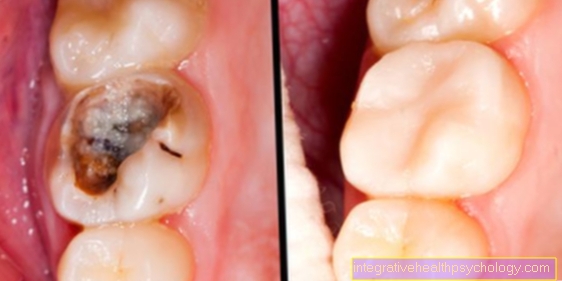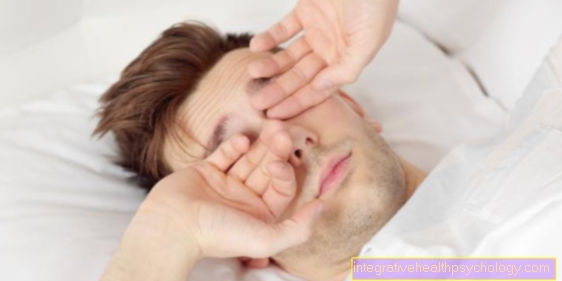Melatonin
Melatonin is an active ingredient that the body itself produces to varying degrees depending on the time of day. Colloquially, melatonin is also called the sleep hormone.
For sleep disorders or disorders of the day-night rhythm, melatonin can be given as a drug to improve the quality of sleep. Since melatonin is an endogenous substance, it is very well tolerated. In Germany, it is a prescription drug, while in the USA, for example, melatonin is also taken regularly by flight crews against jet lag.

Indications for melatonin administration
The main reason for prescribing melatonin in Germany is primary insomnia with poor sleep quality in those over 55 years of age. Since the long-term effects of melatonin have hardly been researched, it is usually a short-term intake to restore a normal day-night rhythm. The intake should be stopped as soon as the sleep rhythm has leveled off again.
In contrast to other sleeping pills, no addictive behavior is to be expected with melatonin. Other sleep disorders, particularly secondary sleep disorders, are not treated with melatonin. In other countries, such as the USA, melatonin is a dietary supplement and is also used to restore the day-night rhythm in flight crews or shift workers. However, this application is illegal in Germany. Another application, which is still in the testing phase, is the treatment of disorders caused by methamphetamines.
Also read:
- Sleep disorder,
- Insomnia,
- Jet lag
- fatigue
Active ingredient and effect
Melatonin is an endogenous hormone, which is also called the sleep hormone. Normally this is produced in the pineal gland in the brain from serotonin.
- Melatonin is a neurotransmitter and can therefore influence communication between nerve cells. Production takes place predominantly at night and controls the day-night rhythm in a complex system between different brain areas.
- The receptors for melatonin are located in the temperature center in the brain, in blood vessels in the head and in the immune system.
Production is particularly hampered by light.
Melatonin can be supplemented with certain sleep disorders, especially when the day-night rhythm is disturbed. To do this, the drug must be taken one to two hours before going to bed. The artificially produced melatonin can thus act independently of light and other disruptive factors. The ingestion of melatonin leads to drowsiness by reducing the level of alertness in certain areas of the brain and lowering the body temperature. Melatonin supplements only work for 20 minutes in non-retarded forms.
The preparation approved in Germany is a sustained release drug that gradually releases active ingredients. This has a half-life of about three hours. The active ingredient is broken down through the kidneys.
You might also be interested in the following article: Sleeping pills
Side effects
Like most drugs, melatonin not only has the desired effect, but can also lead to sometimes serious side effects. However, the side effects are never a must, just a possibility. They all occur at most occasionally, which means that every hundredth to one thousandth sufferer is affected by these side effects. Possible are:
- Daytime sleepiness and difficulty concentrating.
- Irritability and nightmares
- Migraines, headaches, nervousness and listlessness
- High blood pressure, abdominal pain, dry mouth, and nausea
- Chest and limb pain
- Liver dysfunction and kidney dysfunction
Among the rare side effects in the psychiatric field counting:
- Anxiety disorders, aggressiveness, tearfulness and depression
Also in Gastrointestinal tract there were different rare side effects, such as
- Indigestion, vomiting and stomach inflammation.
To the neurological side effects counting:
- brief loss of consciousness, attention deficit and restless legs syndrome.
- Decreased visual acuity, increased tear formation and skin changes.
Changes in the blood count have also occurred in rare cases. If side effects occur, the attending physician should always be contacted.
interaction
- Taking fluvoxamine at the same time as melatonin can lead to a seventeen-fold increase in melatonin levels and should therefore be avoided.
- Oral contraceptives and cimetidine can also increase the effects of melatonin.
- Melatonin can increase the effects of other sleep-inducing substances, such as benzodiazepines and Z-drugs.
- Even with anti-epileptic drugs and anticoagulants, side effects cannot be ruled out.
With many other drugs, the effectiveness of melatonin or the respective other active ingredient is reduced or increased. The intake should always be discussed with the attending physician.
Counter-indications
An absolute reason for exclusion from taking melatonin is only the intolerance of one component of the drug, as melatonin itself is also produced by the body.
However, caution should be exercised when taking other medications. The possible interactions and side effects should be carefully considered. Studies on long-term use are not yet available, which is why this could result in further contraindications.
Melatonin and alcohol
Alcohol and melatonin should not be consumed, as alcohol consumption significantly reduces the effect of melatonin and reduces the quality of sleep. In the case of frequent alcohol consumption or alcohol abuse, this should be treated first, as the sleep disorder can often already be treated by renouncing alcohol.
Use during pregnancy and breastfeeding
In animal studies, no negative effects on pregnant women have been observed so far. However, as the number of studies is very thin, it is not recommended to use it during pregnancy. Since the body's own melatonin passes into breast milk, it can be assumed that the drug will also find its way into breast milk. Therefore, breastfeeding women are not advised to take melatonin. The ingestion of sleep-promoting substances can also always lead to a higher wake-up threshold when the baby calls in at night.
Also read: Medication during pregnancy
Effectiveness of the pill
Since the breakdown of melatonin works via the same complexes as the breakdown of the pill, an interaction cannot be ruled out. On the one hand, taking the pill can increase the effect of melatonin and a reduced contraceptive effect of the pill cannot be ruled out with certainty. Those affected should therefore also use other contraception and not rely on the effect of the pill.
You might also be interested in the following article: Which drugs affect the way the pill works?
Melatonin intake in children
In Germany, melatonin is only approved for primary insomnia in older people. There are no studies available for use in children and there is no approval for this in Germany.However, this is the case with many drugs used in paediatrics because studies are usually not conducted on child patients. Pediatricians therefore often work off-label and give drugs that are not directly approved for children. However, this should be left to the pediatricians and should not be done independently.
You might also be interested in the following article: Medicines for children and toddlers
dosage
The normal dosage of melatonin is a dose of two milligrams daily. These should be taken one to two hours before the desired bedtime. The dosage can be maintained for 13 weeks and should not be taken permanently.
- There are no studies and no approval for use by children.
- Since melatonin is eliminated via the kidneys, a dose adjustment may be necessary if the kidney is damaged. However, this has not been further investigated.
Since these are prolonged-release tablets, the tablets must be swallowed whole and must not be crushed or bitten into.
What happens in the event of an overdose
In the event of a significant overdose, daytime sleepiness and poor concentration are to be expected. This does not increase the frequency of other side effects. Since melatonin is broken down quickly by the body, no special measures are required. The active ingredient should lose its effect after about 12 hours.
price
A pack of 30 Circadin tablets, the only preparation approved in Germany, costs 35 euros.
However, those affected only have to pay an additional five euros, as the preparation is financed by the health insurance company. We advise against non-prescription variants from abroad, as they are often counterfeits and the preparations are illegal in Germany.
Melatonin is available without a prescription
In Germany, melatonin requires a prescription and there is only one approved preparation. Buying preparations from abroad is illegal and can also be dangerous as there are many counterfeits.
In other countries, such as the United States, melatonin counts as a dietary supplement and is available over the counter in supermarkets.
Alternatives to melatonin
For some sufferers, good sleep hygiene can help improve symptoms. This includes a regular bedtime with not too long time in bed and a very dark, quiet sleeping environment.
Rituals, such as a warm drink to help you fall asleep, can also improve sleep. If the sleep disorders persist and lead to an impairment in everyday life, the family doctor can prescribe sleeping pills, such as Z-drugs. However, since these offer a high level of habituation and can also be addicting, they should be used with caution.





























